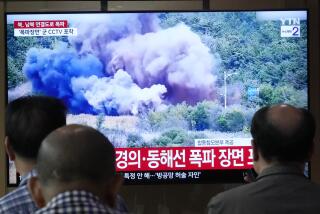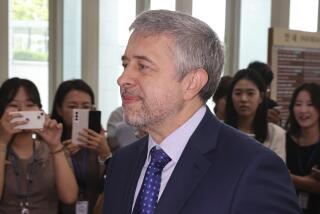N. Korea Seeks Better Ties With Seoul and Tokyo
BANGKOK, Thailand — North Korea continued its diplomatic charm offensive Wednesday, when its foreign minister met for the first time with his counterparts from Japan and South Korea and pledged to try to improve his communist nation’s troubled relations with both neighbors.
During one of the meetings here in the Thai capital, North Korean Foreign Minister Paek Nam Sun agreed to resume stalled talks on normalizing relations with Japan, step up exchanges and visits between the two countries and try to “settle the past” that continues to divide the two nations, Japanese Foreign Ministry spokesman Chikahito Harada said.
Despite years of on-and-off negotiations, Japan and North Korea never signed a treaty establishing diplomatic relations after World War II, and the promised effort to “settle the past” refers to North Korea’s long-standing demand for compensation for Japan’s occupation of Korea. Paek and Japanese Foreign Minister Yohei Kono agreed that a 10th round of normalization talks will be held Aug. 21-25 in Tokyo, Harada said.
In a separate meeting with South Korean Foreign Minister Lee Joung Binn that was described as “very amiable and constructive,” Paek also agreed to cooperate with South Korea in international diplomatic forums, including the United Nations, where the two Koreas have sparred for years.
U.S. Secretary of State Madeleine Albright, whose trip to Thailand for a meeting of the Assn. of Southeast Asian Nations, or ASEAN, was delayed because of the Middle East peace talks, was expected to arrive Friday in Bangkok to meet with Paek. If it comes off as scheduled, it would be the highest-level meeting between U.S. and North Korean officials since the end of the Korean War.
In the past two months, the mysterious North Korean leader Kim Jong Il has traveled to China to meet President Jiang Zemin, received South Korean President Kim Dae Jung and hosted Russian President Vladimir V. Putin. On Wednesday, Russian Foreign Minister Igor S. Ivanov was quoted by the Itar-Tass news agency as saying that Kim Jong Il had agreed to travel by train from Pyongyang, North Korea’s capital, to Vladivostok and then on to Moscow, a trip that would take at least a week. Kim has also pledged to make a reciprocal visit to Seoul.
These developments, together with the diplomatic flurry in Bangkok, make it clear that the once-hermetic Stalinist regime is anxious to end its international isolation and court new allies to help rebuild its shattered economy, collapsed trading relationships and an agricultural system that has left the country vulnerable to famine.
But a senior American expert on Korea cautioned against assuming that the North’s hard-line regime has fundamentally changed.
“North Korea has always sought greater international recognition, greater international legitimacy and to broaden its international donor base,” said L. Gordon Flake, executive director of the Mansfield Center for Pacific Affairs in Washington.
For most of the 1990s, North Korea was preoccupied with the loss of its Cold War patrons, a standoff with the United States over its nuclear program, the death of its founder, Kim Il Sung, floods, famine and economic disaster.
“North Korea has now begun an active process of engaging the rest of the world,” Flake said. “It’s part of Kim Jong Il’s coming out. . . . But I’m not convinced that it portends policy changes, let alone systemic changes.”
Nevertheless, the symbolic moves toward diplomatic engagement have been backed by the South Koreans and hailed by ASEAN leaders, who welcomed North Korea’s attendance at the group’s regional forum on security issues, which begins today.
“This is the first time in any place anywhere that all protagonists . . . in Northeast Asia and the Korean peninsula will be here together,” Thai Foreign Minister Surin Pitsuwan, the host of the ASEAN regional forum, said Wednesday before escorting Paek into meetings with other Asian officials. “We expect some diplomatic breakthroughs.”
The Thai diplomat also gave his North Korean counterpart some advice on dealing with the international media that mobbed Paek.
“You’ll get used to it,” Surin quipped as the dazed-looking Paek was quickly hustled off to safety.
The most intractable problems--North Korea’s nuclear and missile programs and its suspected abductions of 10 Japanese nationals ranging from schoolgirls to fishermen--were not raised publicly Wednesday.
Choi Young Jin, South Korea’s deputy minister for policy planning, said the nuclear and missile issues were mentioned during Paek’s meeting with his South Korean counterpart, but he declined to elaborate.
“I am not going into detail because this is the first meeting in half a century--this is an opportunity for us, and we have to nurture and cherish it,” Choi said. He said he had no further information about Putin’s report that Kim Jong Il had agreed to discuss scrapping North Korea’s missile program in exchange for Pyongyang getting access to international rockets to launch space probes.
U.S. officials have said they want to know more about this reported offer, prompting speculation that Albright may raise the issue with Paek on Friday. North Korea is expected to push to be removed from the U.S. list of terrorist nations, which would clear the way for a lifting of sanctions.
More to Read
Sign up for Essential California
The most important California stories and recommendations in your inbox every morning.
You may occasionally receive promotional content from the Los Angeles Times.










